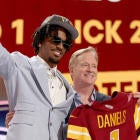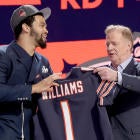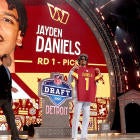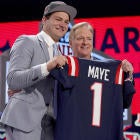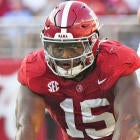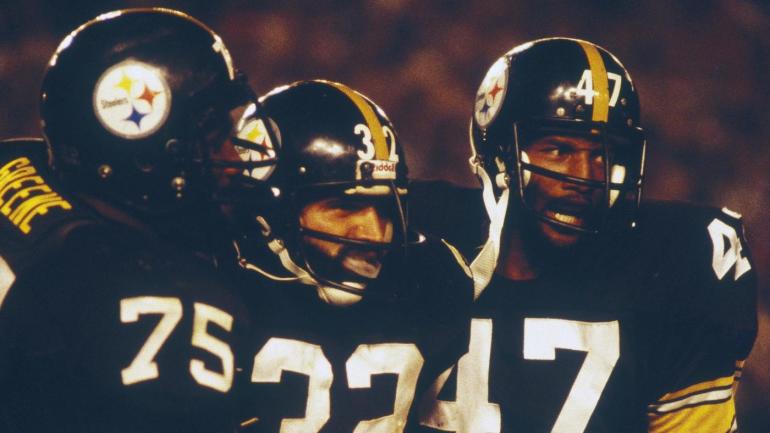
Before he hoisted his first Lombardi Trophy, reports had already began to surface regarding Sean McVay's eventual departure. Ditto star pass rusher Aaron Donald, as it appears that the Rams' victory in Super Bowl LVI is destined to fall under the category of one-hit wonders.
If Donald does indeed decide to call it a career, the Rams will likely become the 18th consecutive Super Bowl champion to unsuccessfully defend their championship. It's hard to believe, but the 2003-04 Patriots, a team that existed before the iPhone, is the NFL's last back-to-back champion, and it's a safe bet that they will remain so for a while.
Speaking of the Patriots, their mid-2010s teams are as close to a dynasty as the NFL has seen since New England's first wave of championships. The Patriots proved that a dynastic run is still possible, but that level of success is an extreme exception and certainly not the rule. It took the greatest coach and quarterback in league annals to make that happen.
Are NFL dynasties gone? It certainly looks that way. Another team may be able to find a way to piece together consecutive championships, but it's safe to say that the '70s Steelers record of four Super Bowl wins in six years is safe from duplication. And given the league's current parody, we may never see a three-peat, something nearly accomplished by the '90 49ers and '94 Cowboys.
Here are the five biggest reasons why the NFL' dynasties may very well be a thing of the past.
1. Free agency
By far, this is the biggest reason for the death of dynasties. Since the true start of free agency in 1993, only two teams (not including the 1992-93 Cowboys) have successfully repeated as champions: the '97-98 Broncos and the '03-04 Patriots. Five teams won back-to-back titles before the start of free agency.
Free agency (along with Jimmy Johnson's departure) largely contributed to the end of the 49ers' and Cowboys' dynasties. It would have crushed the '70s Steelers, who had 22 players leave Pittsburgh with four Super Bowl rings. It's safe to say that many of those players wouldn't have been around for the team's last two championship runs in 1978-79.
2. Salary cap
Every year, teams are forced to make tough decisions in terms of personnel. Inevitably, each NFL team has to part ways with a player each offseason that was a vital part of the team the previous season. The Buccaneers' current salary cap challenges likely factored into Tom Brady's decision to retire after the 2021 season. The Rams, by virtue of several big trades, were able to build a championship roster despite having little cap space and draft capital. But Los Angeles is now facing significant cap challenges this offseason that will undoubtedly lead to the departure of several key players.
3. Scouting enhancements
The Packers and Steelers built their dynasties with players who were largely overlooked during the pre-draft process. Both clubs were ahead of their time in that they scouted and drafted players from Historically Black Colleges and Universities. Former Steelers scout Bill Nunn was recently inducted into the Pro Football Hall of Fame after scouting several prominent players that included L.C. Greenwood, Mel Blount, Frank Lewis, Dwight White, Ernie Holmes, Joe Gilliam, John Stallworth and Donnie Shell.
Cooper Kupp, the reigning Super Bowl MVP, is an example of a future NFL star who flew under the radar. But with more advanced scouting and the heightened importance of pro days as well as the NFL Scouting Combine, surprises such as Kupp are a rarity.
4. Extended season
A longer season means more injuries and a smaller chance for championship-contending teams to stay healthy for an entire season. A big reason for the Bengals' recent Super Bowl run was the fact that they largely avoided any major injuries during the course of the season. The Rams likely wouldn't have won the Super Bowl if not for the trade of Odell Beckham Jr. and the late-season acquisition of retired safety Eric Weddle. Beckham went from being a luxury to a necessity after Robert Woods' season-ending injury. Weddle was signed to help fill a void in the secondary created by injuries.
Los Angeles also benefitted from the unexpected return of running back Cam Akers, whose return gave them a formidable running back trio that also included Darrell Henderson and Sony Michel, who was acquired via a trade with the Patriots following Akers' injury.
The Rams showed that teams must have elite depth in order to finish the race. But given the league's roster and salary cap restrictions, building a talent-heavy roster is harder than ever.
5. Lack of patience
Sometimes, it takes a while for players and coaches to get their footing before discovering their potential. In today's climate, Chuck Noll probably wouldn't have been given enough time to lead the Steelers to four Super Bowls after Pittsburgh won just 12 games combined in his first three seasons. His quarterback, Terry Bradshaw, probably would have been jettisoned after throwing 46 interceptions against 19 interceptions in his first two seasons.
One can say the same about the coach and quarterback of the '90s Cowboys. Jimmy Johnson endured a 1-15 season before leading the Cowboys to back-to-back Super Bowls. Troy Aikman failed to win a single start as a rookie before becoming the first quarterback to win three Super Bowls before his 30th birthday.
The Bengals were rewarded for their patience in 2021. Despite a 6-25-1 start, Zac Taylor was given a vote of confidence by Bengals owner Mike Brown last offseason. Taylor received an extension on Wednesday after the Bengals came a few plays from winning the franchise's first Super Bowl. Whether or not more teams exercise similar patience in the coming years will be something to monitor. But given today's instant-gratification climate, along with the mounting pressure to win in professional sports, it doesn't seem likely.














